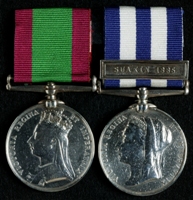

(L to R) Afghanistan Medal; Egypt Medal with clasp 'Suakin 1885'
We don't know anything about James' family or early life.
He joined the 63rd Regiment of Foot and was given the service number 1126. This tells us he enlisted in around September 1866. The Regiment was based in Ireland when he enlisted, and it stayed there until late 1870, when it sailed for India. When James arrived he was first stationed in Hazaribagh in the modern Jharkhand State. In November 1873 the Regiment moved to Jhansi, and 4 years later they moved again to Meean Meer, near Lahore in modern Pakistan.
Cholera was a constant danger in India. During outbreaks at Meean Meer the 63rd Regiment had to march from place to place for many days. If they had stayed in one place their water source could have become infected, with deadly consequences. The regiment moved to Umballa during November 1878.
The 63rd Regiment played a small part in the Second Afghan War of 1878-80. James was with them in August 1880 when they marched from Sibi in modern Pakistan to try to relieve British forces under siege in Kandahar, Afghanistan. Another force marching south from the Afghan capital Kabul got there first so James will have seen very little fighting. After the end of the war the 63rd Regiment stayed in Kandahar until the British withdrew in April 1881.
On the 1st July the 63rd Regiment was renamed the 1st Battalion of the Manchester Regiment. They were based in Quetta at the time. By December the 1st Battalion were in Sialkot, still in modern Pakistan, where they would remain until they were ordered to Egypt.
The Anglo-Egyptian War broke out in June 1882 after the pro-British Khedive was deposed. Britain wanted to protect its commercial investments in Egypt, as well as the Suez Canal, which gave access to India. The 1st Battalion was sent to Egypt on the 6th September to join a larger force that had already landed. For this reason they did not see very much fighting. The war ended later that month with the British restoring the Khedive to power, but having much more control over the country.
James' time overseas ended on the 3rd November 1882. He returned to the UK and was stationed at Warley in Essex, and then at the Tower of London for a time. By March 1883 he was stationed at the Manchester Regiment Depot in Ashton-under-Lyne.
The 'Suakin 1885' clasp on James' Egypt Medal suggests that he took part in the Suakin Expedition to the Sudan. This was launched in March 1885 and was intended to defeat Osman Digna. This Sudanese leader had been responsible for the capture of Khartoum and the death of General Charles Gordon that January. The Manchester Regiment did not take part in this expedition, so it is likely that James had been transferred to another unit. Unfortunately we don't know which one.
The rest of James' life is a mystery. As well as his Afghanistan and Egypt Medals, James was also awarded the Khedive's Star for his Army service. His medals were donated to the Museum of the Manchester Regiment in December 1945.




